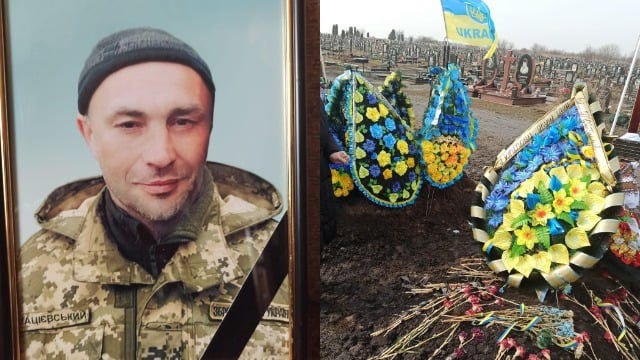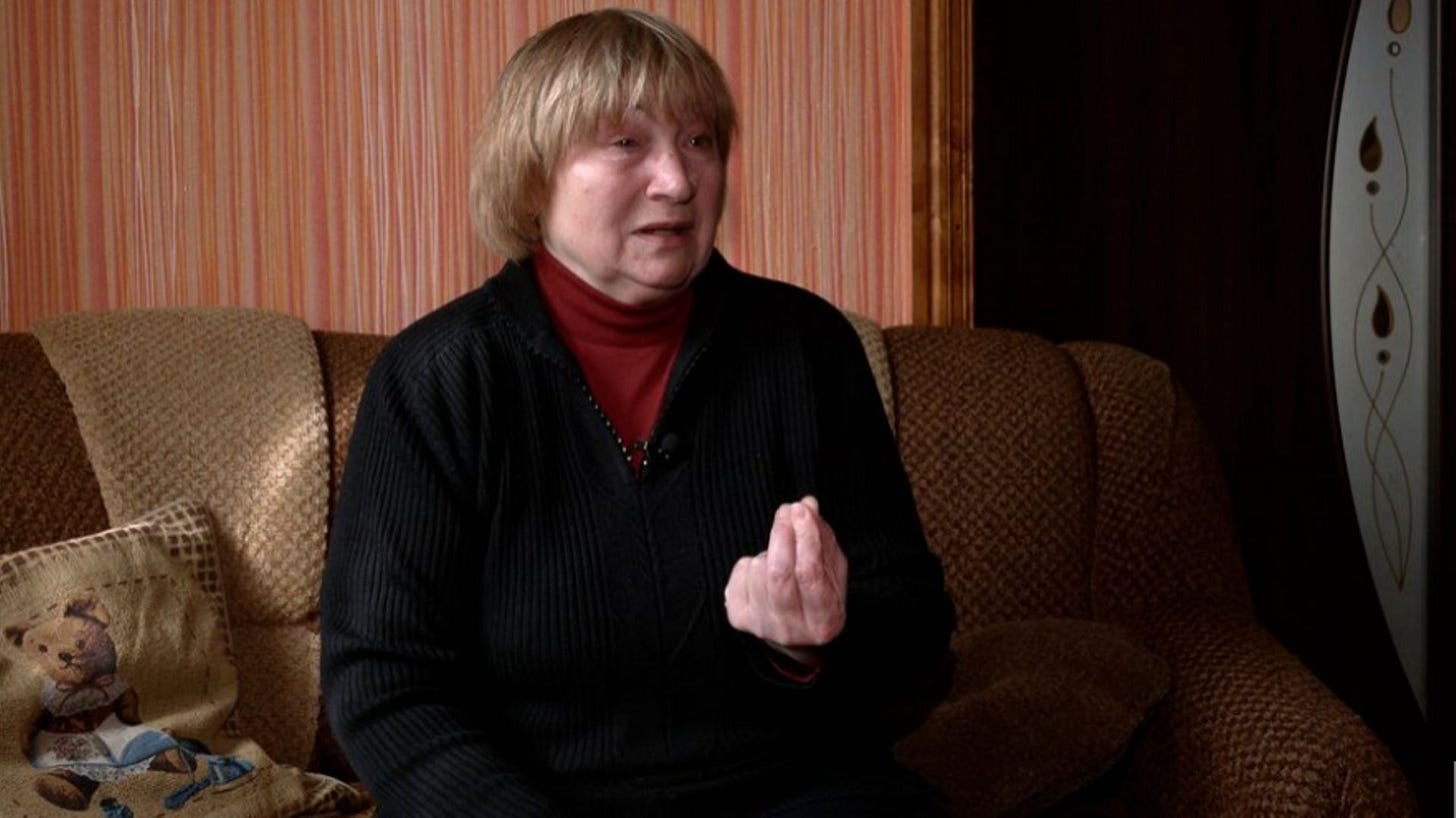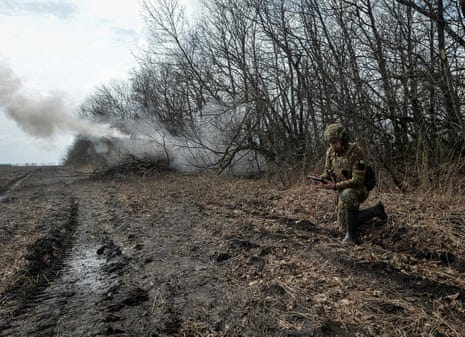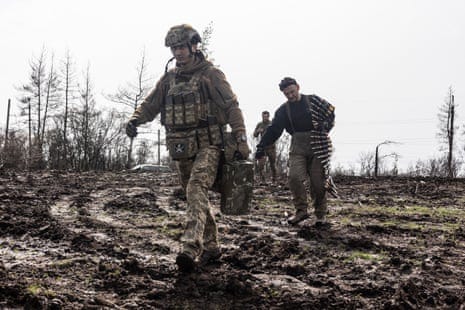Apr 12: Promise and pain: The grueling battle for Bakhmut
As published by NBC News on April 7, 2023
Before reading…
Promise and pain: The grueling battle for Bakhmut could guide Ukraine’s future
By Mo Abbas, Matt Bradley and Ostap Hunkevych, NBC News, April 7, 2023
NIZHYN, Ukraine — Checking social media one day after work, Paraska Demchuk saw a photo of a man she immediately recognized as her son. The image was from a video of his execution that went viral on social media. Smoking his final cigarette in a wooded area, he shouts “Glory to Ukraine” before collapsing in a hail of bullets.
“In the end, he understood he couldn’t do anything. He had no weapon, no grenade, no gun. But he had these words,” Demchuk, 67, told NBC News at her modest home in the town of Nizhyn, about 90 miles northeast of Kyiv.
Those words helped galvanize a nation even as the graphic video devastated a mother, with her son Oleksander Matsievsky hailed as a hero for uttering the rallying cry in his final moments.
The 42-year-old sniper was killed on Dec. 30 near Bakhmut, Ukraine’s security services said, and his defiant demise has come to symbolize the country’s defense of the eastern city — arguably the most fiercely contested territory in Ukraine since Russia’s invasion.
Mercenaries, mud and morale
Some experts question Bakhmut’s strategic importance, and worry that Ukraine — whose nimble, lightning counteroffensives saw it recapture swaths of territory late last year — may be pouring valuable resources into a grinding battle that will undermine fresh offensives planned for the spring.
But eight months of brutal trench warfare have transformed Bakhmut from an obscure mining city into a modern-day Stalingrad whose fate could shape the course of the war.
Victory for either side would be a huge morale boost, and could rally support from respective allies, providing momentum to shift a front line that has remained largely static for months.
For Demchuk, tearful and mourning the loss of her only child, there can be no retreat from Bakhmut.
In a corner of her living room Ukraine’s highest medal of honor, awarded posthumously in a red leather-bound case, dominates a shrine to her son.
“We have no other option but to continue fighting. All this blood that was lost cannot be lost in vain. We need to continue defending ourselves,” she said.

Bakhmut is almost surrounded by Russian forces, its Ukrainian defenders perilously close to being encircled after months of brutal fighting that has increasingly seen both sides suffer heavy losses. On Sunday Moscow’s forces said they had captured the administrative center of the city, but Ukrainian troops continued to hold western areas. Ukraine said its defenders still held Bakhmut.
Neither side publishes casualty numbers among its own troops, but on one day in March alone Kyiv’s military said it killed 221 of Moscow’s forces in Bakhmut, while Russia said it killed 210 Ukrainian soldiers in the broader Donetsk region in which it lies.
But according to Mykhailo Podolyak, an adviser to President Volodymyr Zelenskyy, Kyiv has Moscow’s forces just where it wants them.

“It is very important to destroy the most powerful Russian units exactly where it’s comfortable for us. The landscape is preferable for us there,” he said in an interview on Thursday at his office in Kyiv.
“Because Russia is concentrating on Bakhmut, Avdiivka and Vuhledar, it cannot attack in other directions — they cannot launch a big offensive somewhere else,” he said, referring to other areas in Donetsk, which forms half of the eastern Donbas region. “Meanwhile, we are preparing our own offensive.”
The Kremlin has made capturing Ukraine’s industrial heartland the focus of its campaign but has appeared to make scant progress toward that goal in the first few months of the year.
The Russian winter offensive has been held back by muddy conditions and military failings, despite Moscow revamping its leadership, calling up hundreds of thousands of reservists and leaning on the Wagner mercenary group’s use of ex-convicts.
But the pressure on Ukraine’s defenders has mounted in recent weeks, and with it so have calls for a withdrawal from some military analysts who view holding the city as no longer worth the cost.
For Podolyak, keeping Russia’s much larger army at bay in Bakhmut for eight months is already a victory of sorts, but losing the city would be a ”huge morale boost for the Russians and massive demoralization for Ukraine.”
He was echoing a point made by Zelenskyy last week, that if Bakhmut falls to Russia, President Vladimir Putin would “sell this victory to the West, to his society, to China, to Iran” with a push for an end to the war on terms favorable to Moscow.
Training for the decisive battles to come
Ukraine hopes to launch a spring offensive of its own that could determine its fate as concerns mount that Western support could wane if Kyiv can’t show a clear path to victory and political calculations weigh ahead of the presidential election.
Yet Kyiv is fast depleting its stock of experienced soldiers, raising questions over the viability of a battlefield push that is slated to begin in the next few months.
“At the beginning of this war, yes, almost all of those who were fighting were experienced servicemen who got their training over several years,” Podolyak said.
“But you have to understand that this is a bloody war. Tragically, people are dying, Ukrainians are dying. People on the front lines are exhausted. And therefore we have to rotate them, and you have to understand the active front line is 1,800 kilometers (1,120 miles) long.”
By holding Bakhmut, leaders in Kyiv appear to be betting they can both wear down Russian forces and buy time to ready their own for what could be a decisive period in the war.
Russia has been accused of throwing thousands of soldiers with little combat experience against well-defended lines to secure small gains in territory, but Ukrainian officials insist their new recruits will not be cannon fodder.

At a heavily forested military training ground just north of the Ukrainian capital, officers put new soldiers through a compressed training program to prepare them for the spring offensive.
“They are doing the very accelerated and contracted version of the standard core training course. They are mastering the basic skills of fighting and survival,” said a training commander, who covered his face with a bandanna and used his call sign “Batman” instead of his name for security reasons.
Media were invited to film troops training, and a group of soldiers with at least some combat experience were put through their paces.
The unit confidently disembarked from an American mine-resistant ambush protected vehicle, moved in formation into a forest and then stormed a trench as snipers provided cover.
Vitaly Markiv, one of the trainers, said these soldiers would be the backbone of units containing less experienced recruits.
“Somebody goes on rotation to the front line, then they return and they transmit that experience to the other soldiers and officers,” he said.
But, he added, more important than troop numbers was continuing Western support and weaponry.
“This year will be the year of revenge, of repayment to the Russians. What we need is the support of the whole free world.”




